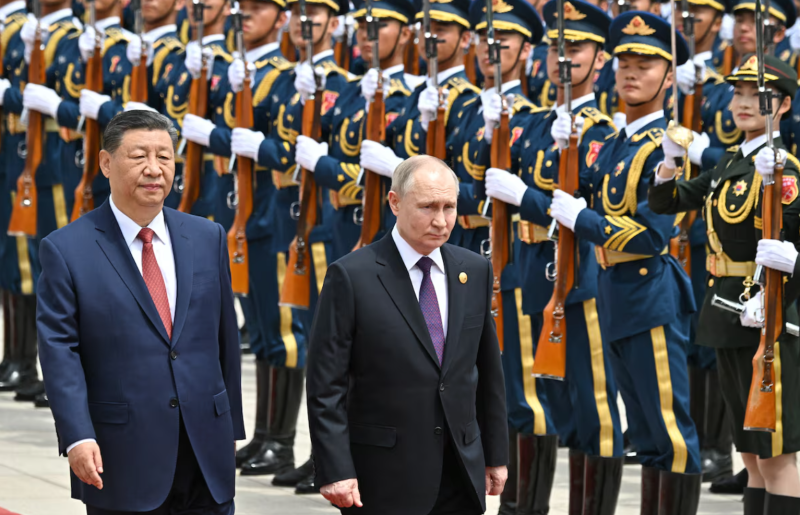
Russian President Vladimir Putin is on a two-day state visit to China, as Russian forces are pressing forward with an offensive in Ukraine’s northeastern Kharkiv region. Putin was welcomed in Tiananmen Square’s Great Hall of the People with full military honors, and the two leaders will participate in a gala where they will celebrate 75 years of diplomatic relations between the two states.
Putin and Chinese President Xi Jinping reaffirmed their “no-limits” strategic partnership on Thursday, even as the West seeks to limit Russia’s gains in the war in Ukraine, and China’s rivalry with the United States is becoming the subject of rising tensions.
The joint statement released after the meeting of the two leaders frames the United States as a waning hegemon whose “Cold War mentality” remains the primary cause of geopolitical chaos. “The United States still thinks in terms of the Cold War and is guided by the logic of bloc confrontation, putting the security of 'narrow groups' above regional security and stability, which creates a security threat for all countries in the region… The U.S. must abandon this behavior," the statement reads. The statement criticized the AUKUS pact between Australia, the UK and the United States as an attempt to “change the balance of power” that “endangers the security of all countries in the region.”
China has largely backed Russia’s position in the Ukraine war, even though it claims to be neutral and has refrained from criticizing Russia’s advance into Ukrainian territory. Beijing has also continued to supply Russia with equipment to keep the war effort in Ukraine going, underscoring Russia’s dependence on China – even as Western sanctions have cut off Russia from most of its international trade. China maintains that it has not provided arms to Russia.
Despite the show of support, Xi Jinping claimed that “China hopes for the early return of Europe to peace and stability and will continue to play a constructive role towards this,” signaling a desire to bring the war in Ukraine to an end.
Russia has also signaled that it would be willing to accept a larger Chinese role in bringing about an end to the war. Ukrainian President Volodymyr Zelenskyy has insisted however that any negotiated settlement to end the war would have to include a complete restoration of Ukrainian territory and the withdrawal of Russian troops, alongside security guarantees for Ukraine.
Xi and Putin share a worldview where they see the West’s decadence and self-righteousness as the primary cause of global unrest. The West’s insistence on treating China as a strategic rival, with the US acting to limit China’s developments in computing and green technology via export controls and trade barriers, further reinforces this view.
With their “no limits partnership,” the two leaders – both of whom have consolidated power at home – seek to remake the international order to suit their preferences and to align the rules of the system with their visions of the world. Both leaders view China and Russia as natural partners in creating a parallel international system that challenges a Washington-led global consensus, moving the world towards a multipolar order.
The two countries have also deepened military ties, jointly holding war games in the South China Sea and organizing collaborative trainings for ground forces.

